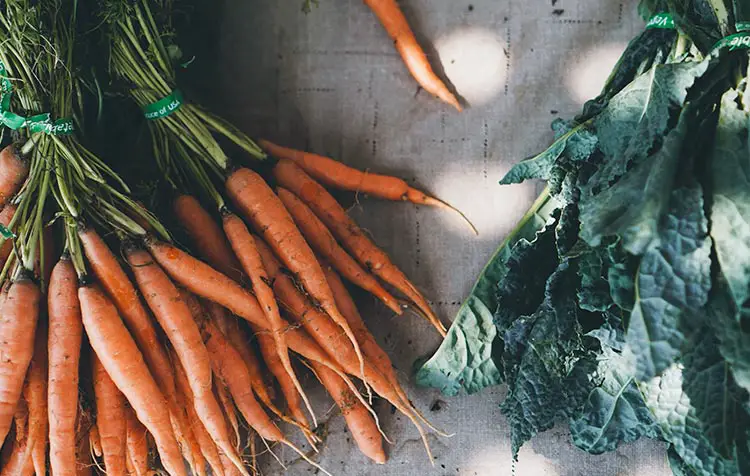Want to know everything there is to know about organic food? Then you are absolutely at the right address! Surely you have already noticed that the demand for organic products is constantly increasing and that foods from organic farming are enjoying ever greater popularity. But what exactly does "organic" mean and why are the products in such demand?
In this article, I would like to answer these and many other questions for you. You'll learn the definition and valuable statistics surrounding the organic market. I'll also introduce you to benefits, examples, and trustworthy organic labels - and show you how to get organic food as cheaply as possible. Let's go!
Here you can find a short overview in advance:
Definition: What are organic foods simply explained?
Organic food is understood to mean Food that comes from organic farming or organic animal husbandry. The aim of food production in harmony with nature is, is above all, not to pollute the environment and the cultivated plants, as well as to produce as healthy as possible, animal and climate friendly, nutritious and tasty food.
The designations "organic" and "eco" have counted since the introduction of the EC Organic Regulation in 1991 to the legally protected terms. With this regulation, the European Union has established clear legal requirements for organic farming. Farmers who want to offer organic products, must clear requirements from species-appropriate animal husbandry, protection of groundwater, annual crop rotation, and the renunciation of the use of chemicals and genetic engineering. Strict controls of organic farms create trust and offer consumers additional security when choosing their food.
Statistics: Facts & figures on organic products
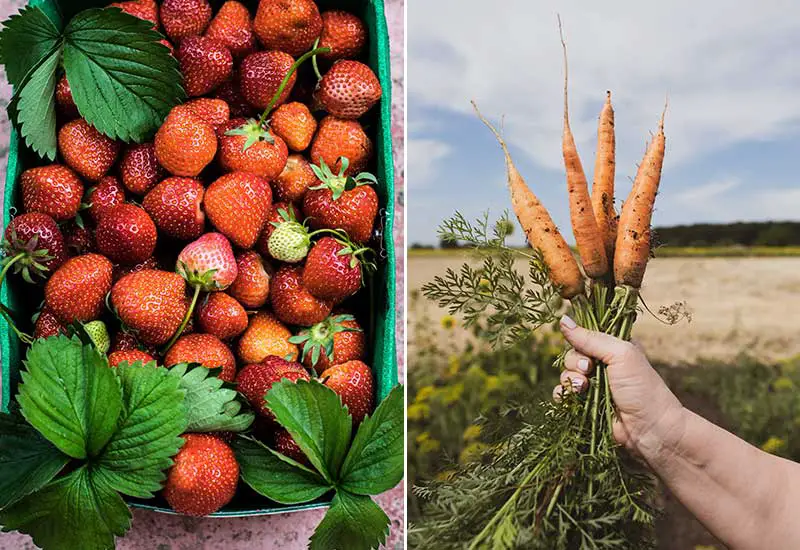
How many organic farms are there actually? Is "organic" just a passing trend? Or is the market growing sustainably? Meaningful facts and figures provide us with clear answers. Here I would like to give you some statistics on organic food, which should give you a feeling for its potential:
- Organic farms: In 2020, there were a total of 35,413 organic farms in Germany.₁ Around one in seven farms relies on organic produce.₂
- Total revenue: In 2021, organic products in Germany could generate sales of 15.87 billion euros. This corresponds to growth of 5.8 percent compared to the previous year.₂
- Regionality: Around three quarters of all organic farms source their raw materials from within a radius of 230 kilometers.₂
- Arable land: In 2021, 10.8 percent of arable land in Germany was farmed organically.₂
- Products: 62.4 percent of all plant-based drinks, 26.6 percent of all meat substitutes and over 16.7 percent of all eggs from German producers in 2021 came from organic farming.₂
Advantages: Why should you prefer organic fruits and vegetables?
Sounds strange, but let's first "brush off" the disadvantages. In fact, organically produced foods are usually A little more expensivethan their conventionally produced counterpart - not always, but often! In addition, they are usually not quite as long lasting and through the opaque jungle of environmental labels and sustainability terms also relatively difficult to compare.
So the legitimate question is: Why should you still consciously buy organic food and prefer it to conventional products? I would like to give you the answer now by means of an extreme Variety of advantages deliver.
Of course also "organic" not a perfect panacea, but organically produced goods are in many ways better than their conventional counterpart! There are good reasons that they give us a better feeling when we buy. Because organic products are...
- environmentally friendly
- healthier
- fair
- animal friendly
- tasty
... more environmentally friendly
Compared to conventional potatoes, apples and other foods, their organic farming equivalents are kinder to the environment - especially the Climate, soils, waters and the Biodiversity!
Drinking water from lakes and rivers, for example, is no longer polluted with fertilizers, nitrates and pesticides. Compliance with the Crop rotation ensures that arable soils retain their important nutrients for the cultivation of all crops in the long term.
Dem Environmental problem of species extinction is also counteracted - whether wild herbs, insects or birds - they all benefit from growing our food as naturally as possible. And since "organic" is mostly also regional, especially about the avoided transport routes for apples from New Zealand, potatoes from Egypt or for animal feed from Brazil, a extreme CO2 emissions prevented be
Good to know: Farmers also have an interest in an intact environment. After all, fertile soils, for example, guarantee that the Pollination of the plants by insects or dry periods as infrequent as possible also the desired long-term crop yield.
... healthier
If organic food protects drinking water, soils, climate and biodiversity, among other things, then of course it also protects our long-term health. Nevertheless means "organic" does not automatically mean that a food is healthy or healthier compared to a conventionally produced counterpart. For example, eating organic potato chips is usually not more beneficial for our organism than eating a cucumber from conventional agriculture.
However: fewer additives, no genetic engineering, no nitrate content, no chemical pesticides, no pesticide or antibiotic residues, no artificial flavor enhancers and aromas - the EC organic regulation limits the health risk for diet-related diseases by organic products fortunately very well.
But organic products are not only "less harmful" to our bodies - they also benefit our health. For example, we benefit from the fact that organic apples or organic potatoes, among other things due to their slower growth, require less water but More nutrients contain
One more thing: The risk of zoonoses, diseases that can be transmitted between animals and humans, is also minimized if we prefer to consume plant products from organic farming.
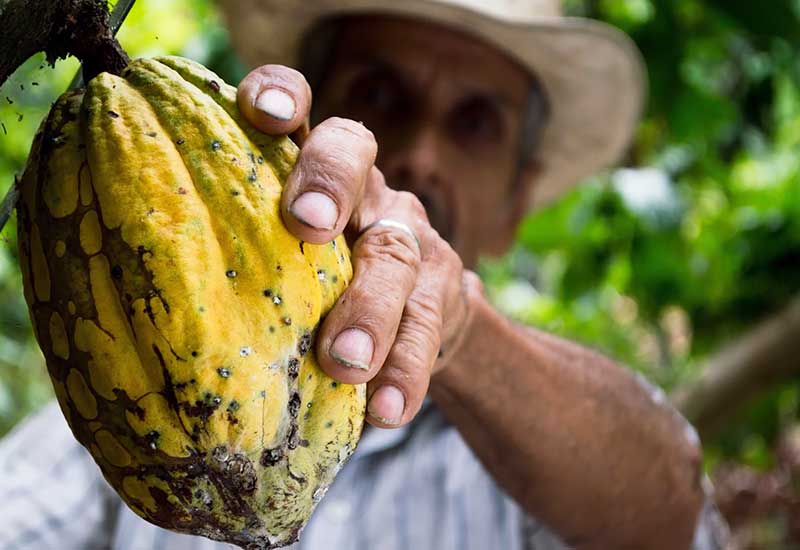
... fairer
Perhaps the organic cucumber may be a little more expensive. However, a much stronger advantage of organic food is that it is transparent, honest and fair - and it is for consumers as well as for producers.
Strict, at least annual inspections of organic farms, clear, assigned inspection numbers, and Tracking capabilities of the production process, provide a certain security in the selection of their own food. A production process, by the way, that is much more labor-intensive and time-consuming compared to conventional cultivation methods and also therefore much more fairly remunerated will.
... more animal friendly
Meat, eggs, milk, cheese and curd cheese of animal origin can of course also be organic food. In order to be allowed to adorn their products with the trustworthy organic seals, the EC Organic Regulation imposes clear requirements on farmers. For example, the animals must not be only ecologically produced feed preserved - they also receive substantially more space, regular outdoor exercise and also in the stable must be Daylight can penetrate. Questionable measures, such as dehorning cows and docking the curly tails of pigs or the beaks of chickens, fortunately also have to be dispensed with.
Those who prefer organic products, thus contributes at least already once to a more species-appropriate animal husbandry and makes its consumption more ethical. Whether animal husbandry is actually species-appropriate and ethical is debatable. In my opinion, it is still an exploitation of the animals, which are ultimately killed, although they are in the best of health. They are simply transported to the slaughterhouse because they no longer bring an economic return. This is another reason why I no longer consume animal foods in the meantime.
Tip: I have written you a detailed article about my Reasons for the vegan lifestyle compiled. If they interest you, feel free to take a look!
... tastier
With organic products, the producers' focus is on their own taste. Also therefore no artificial flavorings and additives or other flavor enhancers are used. Plant growth is somewhat slower in organic farming and their water content lower - as a result, organically produced fruits and vegetables are not only more nutritious, but also taste Much more intensive.
Examples: Which foods are mostly organic?
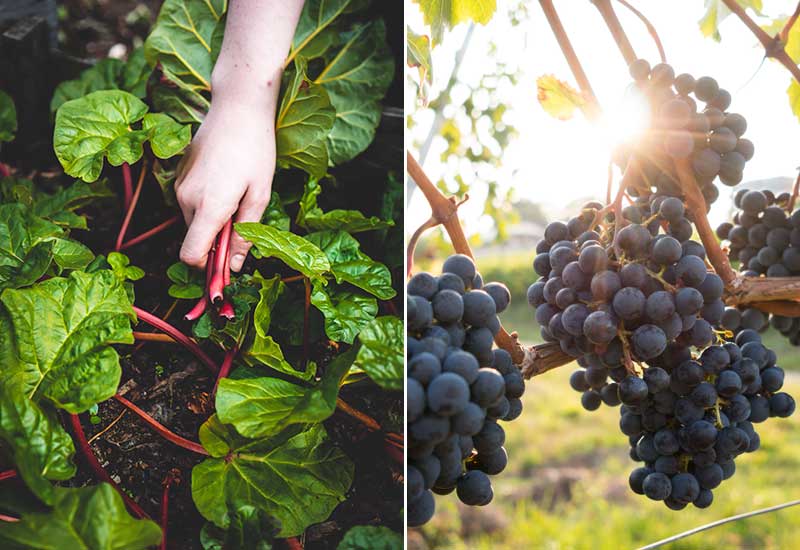
Most organic products fall into the categories of dairy products, baked goods, and fruits and vegetables. However, in principle, any product can be completely or mostly produced organically. For example, also Organic wines more and more popular.
Notice: Did you know that Wine not always vegan or vegetarian is? I explain the background in the linked article.
The German Organic Food Association (BÖLW) provides in its Industry Report 2022 clear figures on the food products that, in their respective categories, have a particularly large Organic share of total sales volume have
- Plant drinks: 62.4 percent (of all products in this category are organic)
- Meat substitute: 26.6 percent
- Eggs: 16.7 percent
- Flour: 15.4 percent
- Milk: 13 percent
- Cooking oil: 10.3 percent
- Fresh vegetables: 9.7 percent
- Yogurt: 8.8 percent
- Fresh fruit: 7.8 percent
- Fresh potatoes: 6.8 percent
Notice: Of course, clothing and cosmetics, for example, can also be of organic quality. For the sake of simplicity, however, I refer to organically produced food in this article.
Organic seal: How can I recognize organic food?
When a seemingly happy cow on a green meadow adorns the product packaging, this often creates a good conscience among consumers - however, the image has no significance - neither for animal welfare, nor for sustainability or health. Terms such as "seasonal cultivation," "from the region," or "sustainably produced" are also meaningless in this context - they leave a lot of room for interpretation and are more likely to be identifying features of classic Greenwashing. Unlike "organic" and "eco", they are not protected by law.
Products whose packaging official organic or ecological seal are produced strictly in accordance with EU organic regulations - and justify the trust that consumers have in them. To quickly identify fair, delicious organic food, look for the following eco-labels on products in organic or supermarkets, natural food stores - or at the traditional weekly market:
- State organic seal (promises compliance with the criteria from the EC Organic Regulation).
- Demeter
- Bioland
- Naturland
- Fairtrade
- Ecoland
- Biopark
- New territory
- …
The BUND recommends consumers to orient their purchases primarily on the above-mentioned seals (and several others) of the growers' associations, whose specifications go far beyond those of the state organic seal.
Zero Waste: How can I save organic food?
Whether organic or not, about one third of all food produced worldwide is lost on its way from the field to the plate. Incidentally, more than half of this is lost in private households by the end consumer.₃
In order to save the mostly still edible food from the garbage can and the Reduce food wasteNowadays, apart from a more conscious consumption and a better purchase planning, you have numerous and quite simple possibilities. Here I present two of them for your inspiration:
- Food Sharing support: Here you can rescue food from participating farms in the best organized way, distribute it to people who can use it and also eat it yourself.
- Prefer crooked fruits and vegetables: With companies like Cross field, Beet rescuer or Etepete you can deliberately buy unshapely fruits and vegetables that do not conform to the classic norm and have therefore been sorted out. Of course, this does not detract from the taste. Just as well you can prefer crooked food in the classic organic or supermarket, the standardized and seemingly perfect goods.
Further Tip: With simple tricks, many Making food last longer. In the linked article you will learn how this works.
Consumption: How can I buy organic food cheaply?
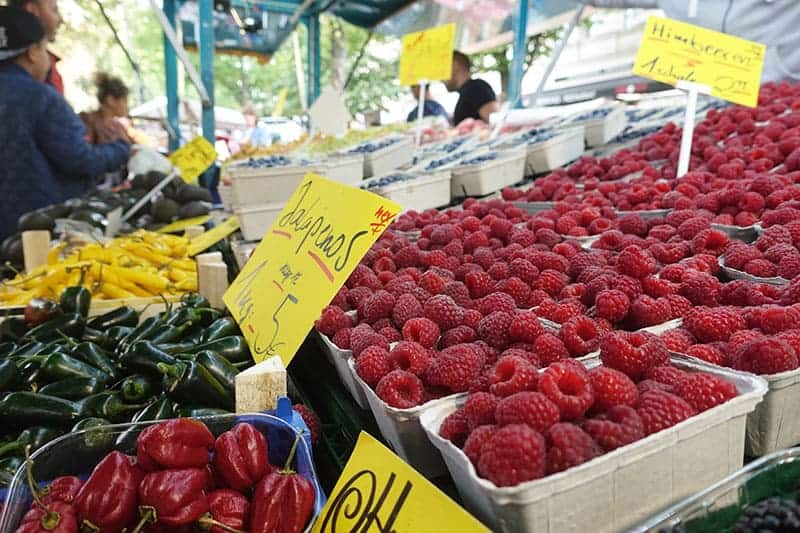
Organic food puts a little more pressure on the wallet than conventional, conventionally produced products. We know that organic quality has its price - but of course there are still ways and means to get hold of the goods from organic farming, apart from the rescue operations with food sharing & Co, nevertheless at affordable prices. A nice side effect is that with the following tips you can not only buy more environmentally friendly, but also still save money through sustainability simply by following your heart.
Use seasonal calendar
Prefer the fruits and vegetables that are in season. When Food not grown in energy-intensive greenhouses they are much cheaper. Long transport routes from warmer climes are also eliminated.
Compare prices and offers
Organic food is now available almost everywhere. Also at the Discounter! So keep your eyes and ears open. At some point, you'll know exactly where you can get your organic goods at a good price. By the way: Especially on Saturdays, supermarkets often have greatly reduced products, because the free Sunday is just around the corner and the fresh food should still be bought as fully as possible.
Prefer regional goods
Short transport routes are not only an effective means of combating the climate change - they also make food prices more affordable. Why? Quite simply, because it costs the producers moneyfor example, transporting apples halfway around the world from New Zealand to Germany by ship and truck.
Tip: How you basically shop more regional you can find out in the linked article.
Freeze excess or cook directly
Food waste is a truly disgusting feature of our Disposable society - especially since at the same time other People starve need to. Rather than throwing away your organic food and buying new again, freeze excess produce or consume it as soon as possible. Pasta, rice & Co can wait - fresh food cannot. Good to know if you want to save money when handling your preferably organic foods - don't you think?
Buy bulk
It's usually not advisable to buy more than you need. But planning is the key. If you have your Make organic shopping a little more affordable buying a bulk pack can be quite advantageous. For example, I personally buy a larger pack of organic spinach or organic broccoli every now and then because I like my meals accordingly and also consume them promptly can. And if not, the leftovers are just frozen 😉.
Save leftovers at weekly markets
Did you know that many producers drop their prices at weekly markets just before the end? The reason for this is simply that they usually have sell fresh goods and need to get rid of them on the given day. So it can be financially worthwhile to go to the market a little later. The risk is, of course, that one or the other organic food is already out of stock.
Eat fresh instead of convenience food
Finished products are the result of countless work steps. Harvest, wash, cut, season, freeze, keep cool.... The more work that is done for you, the more expensive it is. If you really want to save money on your organic purchases, then you should prefer fresh products and prepare your own meals.
Eat less meat/no meat
In addition to ethical, ecological and health-related motives, there are also financial reasons for not using any or at least clearly Eat less meat. The "detour animal" is expensive - the animal feed must be grown, the stables cleaned and the technology purchased and maintained. This is already the case with meat from the Factory farmingbut especially with organic meat, noticeable in the wallet. It is therefore cheaper to consume the plants directly.
Prefer organic food - for ecological and health reasons.
You quickly realize that organic food is not a short-lived trend, but illustrates a conscious and clear consumer choice for delicious, sustainable, animal-friendly, fair and healthy food. And aren't those the things we all want?
My wish is that at some point not organic food, but conventional products that show antibiotic or pesticide residues, are genetically manipulated or full of additives, will be specially labeled. After all, organic food is natural food - and therefore what we and future generations consider to be "the normal" should understand. This rethinking alone would improve our Making life more sustainable - from one day to the next.
The organic cucumber may seem a bit expensive at first glance. But actually it is only worth their real price - unlike the cucumber from conventional agriculture, whose price may be "cheap" and tempting, but whose real costs are borne by the planet and our health, among others. One more reason to choose products of organic origin in the future.
Do you have any questions, tips or suggestions about the article or about organic food in general? Then I look forward to your comment.
Stay sustainable,

PS.: If you want to learn even more about climate-friendly nutrition, I can recommend our Book "Kochen fürs Klima" to the heart. It will give you the motivation you need, as well as tips and recipes for practical implementation. Here you get it*. Have fun reading!
References:
₁ foodwatch e.v.: Bio-Branche - Zahlen, Daten, Fakten (Stand: 22.06.2021), available at https://www.foodwatch.org/de/informieren/bio-landwirtschaft/zahlen-daten-fakten. [03.10.2022].
₂ Bund Ökologische Lebensmittelwirtschaft: Branchen Report 2022, available at https://www.boelw.de/fileadmin/user_upload/Dokumente/Zahlen_und_Fakten/Broschuere_2022/BOELW_Branchenreport2022.pdf. [03.10.2022].
₃ Umweltbundesamt: Wider die Verschwendung (as at: 30.04.2020), https://www.umweltbundesamt.de/themen/wider-die-verschwendung. [03.05.2021]

